How Many Years Ma in Graphic Design
Why choose this course at London College of Communication
- Subject Expertise: You will be situated within a progressive site of award-winning pedagogic development and critical subject debate. The course is delivered by an accomplished team of awarded design practitioners, published researchers and experienced educators.
- Progressive Practice: Our graduates enter into complex contexts with curiosity and confidence, informed with in-depth subject knowledge, advanced design skills and a resilient attitude. Graduates initiate new directions for the practice of graphic design, participate in current and future debates on the practice and secure high-profile careers in key areas of design practice, research and education.
- Design Discourse and Debate: Leading critical thinkers, design practitioners, theorists and writers are frequent guests and correspondents to the course – notably Turner Prize-nominees Forensic Architecture, design historian and writer Alice Twemlow, and world-renowned practitioners Paul Elliman and Jan van Toorn.
- Making Public: Our participants socialise their practice with key institutions, organisations and communities throughout the course with projects such as the In Search Of… series, Positioning Practice and A Line Which Forms a Volume: a critical reader of design research published by the course, with contributions from Stuart Bertolli-Bailey (Dexter Sinister), Jack Self (Real Review), Francisco Laranjo (Modes of Criticism) and more.
- Community: Our postgraduate community offers opportunities to engage in research. Graduates can work towards PhD progression; and interact with a growing number of research hubs at LCC, such as Supra Systems Studio, Design Activism Research Hub, and many others across UAL.
- Excellence in resources: LCC's exceptional facilities span both the traditional and contemporary processes from letterpress, screen printing, photography, 3D construction and bookbinding to 3D printing, laser-cutting and sound engineering.
Online Open Day
(Recorded March 2021)
Overview of studying MA Graphic Media Design at London College of Communication.
-
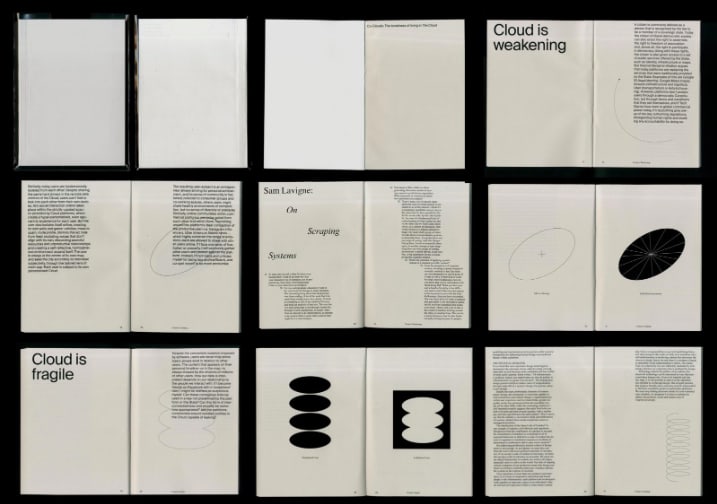
, Co-Clouds, Jaime del Corro -
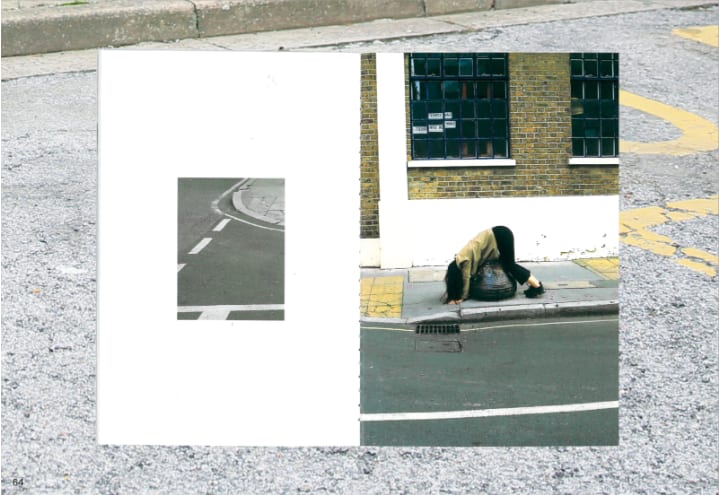
, Micro-resistance is, Zifan Wang -

, Non-Digitalised Emotion, Ziqi Huang -
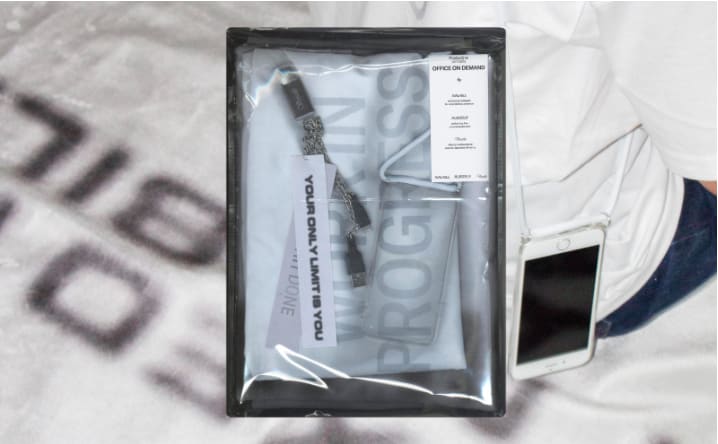
, Productive Liminality - Office on Demand, Paloma Moniz -
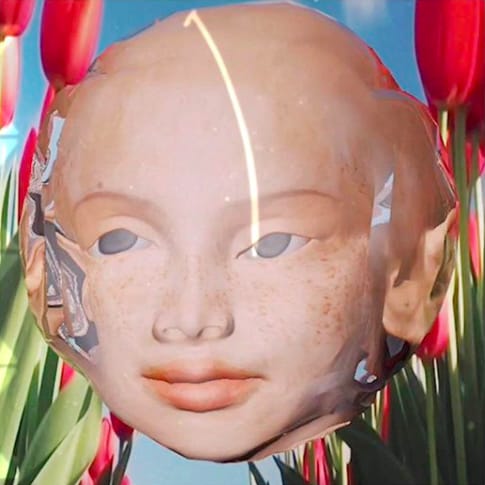
, You are a happiness gadget, Yinjun Diao -

, Restart Program of the Apollo Project, Ying Ye
Student voices: Roxy Zeiher
Roxy talks to us about her project The Copy Machine which explores artificial intelligence.
Non-digitalised Emotions is a visual experiment critiquing the emotion quantification performed by emotional AI.
Work by: Ziqi Huang
This research is positioned within the field of political design, and is intended as a think tank for ideas about power and leadership, the status quo and subversion, representation and reproduction.
Work by Aldo Caprini
Here be Dragons is a book that describes Terra Ignota, a mysterious island, autonomous from the rest of the world – 'Mainland' – and alien to the notions of law and government.
Work by Eugenia Luchetta
-
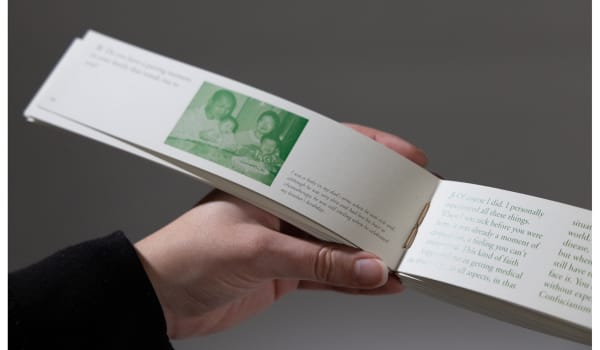
Image credit: Wendy Xiuwen Chen, MA Graphic Media Design. We chat to Wendy Xiuwen Chen and her mentor, graphic designer and artist June Mineyama-Smithson about their experiences of taking part in the LCC Industry Mentoring Programme.
-
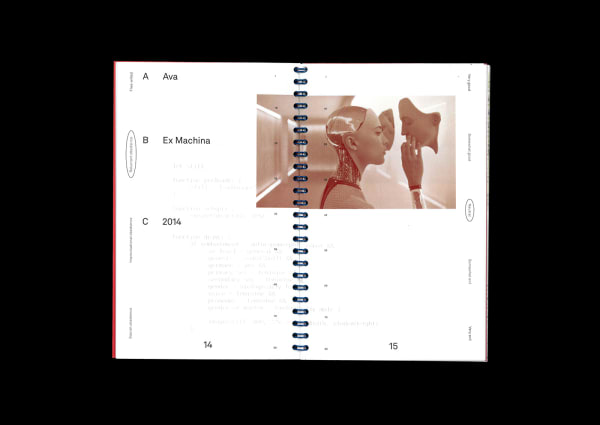
Image credit: Victoire Colliou, MA Graphic Media Design. We chat to MA Graphic Media Design student Victoire Colliou and her mentor, founding partner and CEO of BLT Communications, Clive Baillie about their experiences of taking part in the LCC Industry Mentoring Programme.
-
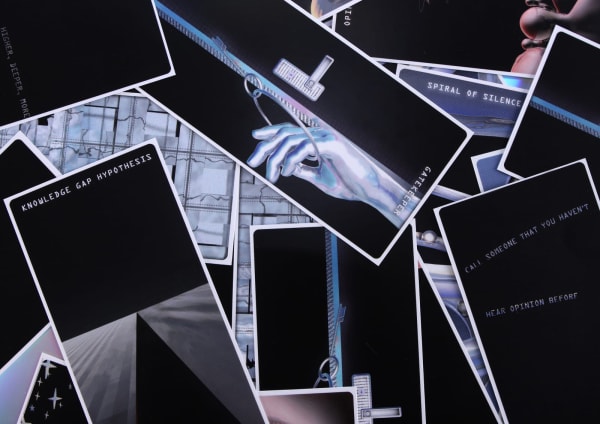
Image credit: Lens of Truth - Yuyao Gong, MA Graphic Media Design. In celebration of this year's Postgraduate Showcase, we explore work from our MA Graphic Media Design graduates.
-
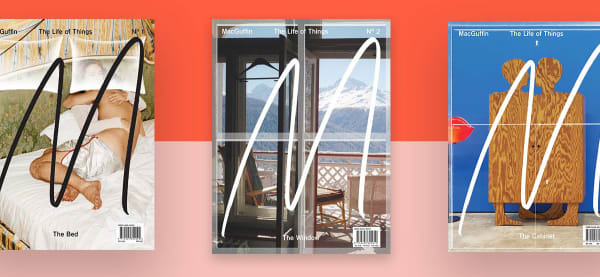
Image credit: Sandra Kassenaar c/o Stack Magazines. LCC industry mentor and Graphic and Media Design graduate Jaya Modi shares her top five bookshelf picks to help you stay inspired and stay creative.
-
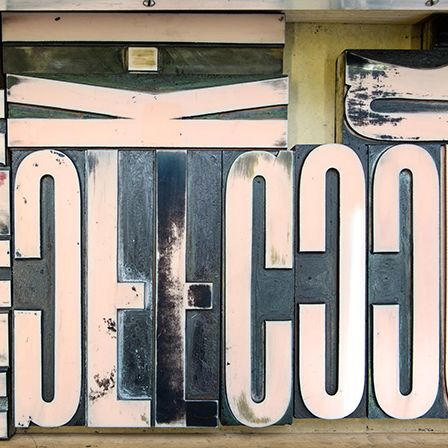
Image © Lewis Bush
Discover our printing techniques, from Lithographic Printing to Print Finishing and Bookbinding.
-
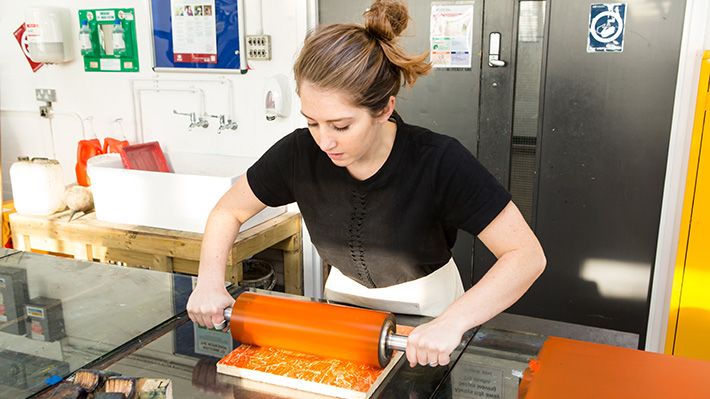
Image © Lewis Bush
This workshop offers a wide-range of expertise in everything from etching to lithography.
-

Students in the Digital Space. London College of Communication, UAL. Photograph: Alys Tomlinson
The Digital Space is an open-plan, creative hub with computers set up with specialist software.
Course overview
Our approach is practice-led and research-oriented.
An integrated approach to theory and practice threads through the course delivered by an accomplished course team of awarded design practitioners, published researchers and experienced educators. This approach offers a distinct opportunity to develop a body of work that is relative and progressive.
What can you expect?
Your self-authored, practice-led enquiry will drive the programme of study. You will work in collaboration with the course tutors, fellow course participants and external partners.
Your long-term independent enquiry will be punctuated with specialist workshops, course-led briefs, tutor, peer and expert critique forums, site visits, lectures and talks from leading practitioners, thinkers and doers.
You will join and participate in a critical studio environment where practice-led, theoretical and historical contexts will be explored, critiqued and contemplated alongside one another.
MA Graphic Media Design runs alongside a suite of established and newly developed postgraduate courses, spanning the rich and diverse spectrum of the current and emergent practices in the fields of visual communication, illustration, interaction design, service design, branding and identity, advertising, documentary, journalism, photography, publishing, public relations, sound arts and screenwriting.
Work experience and opportunities
Throughout the course, you will have the opportunity to work in partnership with a team of course tutors and guests with specialist knowledge in practice/s of graphic design spanning commissioned work, research practice and teaching.
You will socialise your practice with key institutions, organisations and communities throughout the course with projects such as the In Search Of… series, Positioning Practice and A Line Which Forms a Volume: a critical reader of design research published by the course, with contributions from Stuart Bertolotti-Bailey (The Serving Library), Jack Self (Real Review), Francisco Laranjo (Modes of Criticism) and more.
Course structure
The course is comprised of four units, delivered across four terms. Throughout a taught week you will have scheduled teaching sessions as well as opportunities to access technical areaas and a wide range of other College resources.
Tailored Skills Development, Academic Support and Language Development sessions are scheduled to support and inform your developing practical and academic literacies whilst you are with us on the course.
Outside of this core delivery, you will have the opportunity to utilise a range of excellent resources available at LCC to produce your experimentation and continue developing your projects.
Your success or failure on the course will depend, to a great extent on how rigorously and responsibly you exercise self-direction and how well you respond to tutorial advice and advice from peers and collaborators. The level of self-management required will increase throughout the course.
Please note: We will assume that you are technically proficient and able to research and develop any further skills you require. Technical tuition is restricted to the tutorial support of individual projects. If you need to acquire a significant skill base, then you are advised to do so before you apply for the course.
Mode of Study
MA Graphic Media Design is in Full Time mode which runs for 45 weeks over 15 months. You will be expected to commit 40 hours per week to study.
Course units
Course units
In 2019 UAL declared a Climate Emergency and pledged to 'make sustainability a required part of the student learning experience'. In response to the climate and ecological crisis the Design School set in place an ambitious Sustainability Action Plan to fully embed responsible practices within the curriculum and in everything we do. As part of this initiative we have updated our course handbooks against a set of social and environmental sustainability principles to ensure that learning outcomes reflect the urgent need to equip students with the understanding, skills and values to foster a more sustainable planet. Our aim is to change the way students think and to empower them to work towards a sustainable future.
MA Graphic Media Design is comprised of four units:
- Unit 1 Critical Perspectives & Methodologies
- Unit 2 Collaborative Project (The Reciprocal Studio)
- Unit 3 Design Enquiry & Definition
- Unit 4 Major Project
Autumn, Term 1
Critical Perspectives and Methodologies (60 credits)
This unit functions as an introduction to postgraduate study, critical and reflective practice, and alternative working approaches that blend graphic design practice, history and theory.
This approach is employed to build a confidence in moving past the familiar into the unknown, through close readings of the variables that shape contemporary graphic design practice. A curated lecture series, anchored by key reference material, will support the studio-based delivery.
Spring, Term 2
Collaborative Unit (20 credits)
The Collaborative Unit urges you to independently initiate opportunities to socialise your research through building relationships with key partners associated with your research agenda/s i.e. institutions, subject experts, users, commissioners, producers, fellow practitioners/researchers, etc.
These activities may take place locally or remotely, through an excellent opportunity for you to establish links with relative industry partners within the thriving design culture here in London.
Design Enquiry and Definition (40 credits)
Alongside the Collaborative Unit, you will continue establishing a hypothesis for your Major Project by testing your projects currency in varied ways through practice-led design methodologies and processes; readings and writings around your field/area of study; and ongoing critical reflection.
The products of this enquiry will feed directly into your Major Project Definition, which you will submit as part of your Design Enquiry and Definition unit submission.
Summer, Term 3
Units summary:
Design Enquiry and Definition (continued)
Major Project (60 credits)
Within this stage of the course, you will further your knowledge and extend your critical and professional understanding through the consolidation and realisation of the Major Project.
You are expected to produce work demonstrating a significant synthesis of research and practice drawing on the skills and knowledge acquired in the first three stages of the course.
Autumn, Term 4
Major Project (continued)
Your Major Project will demonstrate, both in content and form, your advanced understanding of graphic design practice, history and theory. You will spend this phase of your study pursuing an argued and distinct line of inquiry working towards a major output (or body of work).
This will be supported by a critical context paper and critical rationale articulating the motivations and objectives of the project acknowledging key theories, contexts, and stakeholders for the research.
Learning and teaching methods
- Workshop
- Seminar
- Lecture
- Tutorials
- Self directed learning
- Speakers and visits
- Assessed assignments
Assessment methods
- Projects
- Research Proposal
- Portfolio
- Critical Context Paper & Rationale
How to apply
Opportunities for all
We are committed to making university education an achievable option for a wider range of people and to supporting all of our students in achieving their potential both during and after their courses.
We welcome applications from people with disabilities. If you have a disability (e.g. mobility difficulties, sensory impairments, medical or mental health conditions or Asperger's syndrome) we strongly encourage you to contact us on disability@arts.ac.uk or +44 (0)20 7514 6156 so that we can plan the right support for you. All enquiries are treated confidentially. To find out more, visit our Disability & Dyslexia webpages.
Entry requirements
The MA Graphic Media Design course team welcomes thoughtful, critical and productive applicants concerned with the effective articulation of design.
The course attracts applicants from a broad range of backgrounds, from all over the world, from an Honours degree course in a field relevant to graphics and media design or those with other, equivalent qualifications. The course team also welcomes students with relevant experience or those who may have previously worked in the industry, or non-traditional backgrounds, as well as those already within employment.
The course has been designed to accommodate flexibility in educational engagement. Your experience is assessed as a learning process and tutors will evaluate that experience for currency, validity, quality and sufficiency.
Your educational level may be demonstrated by:
- Honours degree (named above);
- Possession of equivalent qualifications;
- Prior experiential learning, the outcome of which can be demonstrated to be equivalent to formal qualifications otherwise required;
- Or a combination of formal qualifications and experiential learning which, taken together, can be demonstrated to be equivalent to formal qualifications otherwise required.
APEL (Accreditation of Prior Learning)
Applicants who do not meet these course entry requirements may still be considered in exceptional cases. The course team will consider each application that demonstrates additional strengths and alternative evidence. This might, for example, be demonstrated by:
- Related academic or work experience
- The quality of the personal statement
- A strong academic or other professional reference
- OR a combination of these factors
Each application will be considered on its own merit but we cannot guarantee an offer in each case.
Language requirements
All classes are conducted in English. If English is not your first language, we strongly recommend you let us know your English language test score in your application. If you have booked a test or are awaiting your results, please indicate this in your application. When asked to upload a CV as part of your application, please include any information about your English test score.
- IELTS 6.5 (or equivalent) is required, with a minimum 6.0 in each of the four skills.
- If your first language is not English, you can check you have achieved the correct IELTS level in English on the Language Requirements page.
For further details regarding international admissions and advice please visit the International Applications page.
Selection criteria
Offers will be made based on the following selection criteria, which applicants are expected to demonstrate:
- Sufficient prior knowledge and experience of and/or potential in a specialist subject area to be able to successfully complete the programme of study and have an academic or professional background in a relevant subject
- Also to show a willingness to work as a team player, good language skills in reading, writing and speaking, the ability to work independently and be self-motivated
- Critical knowledge of and enthusiasm for the subject area and capacity for research-led design, intellectual inquiry and reflective thought through: contextual awareness (professional, cultural, social, historical); evidence of research, analysis, development and evaluation (from previous academic study and employment) and a grounded understanding of the world of sonic, visual and networked culture and be able to engage in and contribute to critical discussion
- In the project proposal a description of the area of interest, field of study and the particular focus of their intended project. This should include an overview of how you intend to go about producing the project and the methodology
- Your portfolio should be conceptual and research-based, you must show your thinking and making process and a curious nature to explore, test and experiment.
Making your application
All applications will be considered by the course team who will consider key elements when making a decision on your suitability to join the course:
- First, they will look at your qualifications and transcript (or projected results)
- Secondly, they will review your personal statement, portfolio and study proposal
- There is no requirement for an academic or professional reference.
Required information for all postgraduate course applications
Before you apply, please take time to read the guidance below. You will be asked to provide the following items and upload documents when completing the online application form:
- Personal details (including full name; date of birth; nationality; permanent address and English language level)
- Current and/or previous education and qualification details
- Employment history
- CV
- Personal statement
Extra information required for applications to this course
- Portfolio
- Study proposal
- Video task
Start your application now
The online application can be saved as you fill it out, so you don't need to complete it all at once. You will also have the chance to review all the information and make any necessary amendments before you press submit.
Apply now
Deferring your place
This course accepts requests from offer holders to defer their place for one academic year. Deferral requests are granted on a first-come, first-served basis until all deferral places are filled, or a deadline has been reached, whichever is sooner. Read our Admissions Policy for details, including how to request a deferral and by when.
External Student Transfer Policy
If you are currently studying at another institution and have successfully completed 60 credits in the equivalent units/modules on your current PG course and wish to continue your studies at London College of Communication, you can apply to transfer.
The Admissions Tutor will consider applications on a case by case basis, subject to places being available. You must apply directly to the course via the course webpage as early as possible.
Further information about the external student transfer policy can be found on the Office for Students Information page.
Start your application now
The online application can be saved as you fill it out, so you don't need to complete it all at once. You will also have the chance to review all the information and make any necessary amendments before you press submit.
CV
Please provide a CV detailing your education, qualifications and any relevant work or voluntary experience. If English is not your first language it is important that you also include in your CV details of your most recent English language test score.
Personal statement advice (approximately 150 words)
Please say why you are applying for this course, outlining relevant prior experience and your current knowledge of contemporary graphic design debates, developments and discussions. Ensure that your personal statement it is well written, clear and free of any spelling mistakes.
It is your chance to impress the course team by showing a strong interest in the subject, demonstrating what you feel you would bring to the course, your appreciation of what the course can offer you and how you feel it might help you in the future. This can be demonstrated through work experience, previous studies and your personal experience.
Study proposal (300-500 words)
Applicants must submit a study proposal(300-500 words) outlining the intentions of their MA research. Please include a description of the area of interest, field of study and the particular focus of the intended project, and an overview of how you intend to go about producing the project and the methodology.
Application deadline
12 January 2022 or 13 April 2022
For postgraduate courses at UAL there are 2 rounds of applications. This is to ensure equal consideration and fairness for all of our applicants. You must apply by 12 January 2022 for Round 1 or by 13 April 2022 for Round 2. We recommend you submit your application as early as possible before these deadlines, to allow the Admissions team to resolve any initial queries about your application as quickly as possible.
When you'll hear from us
This course receives a high volume of applications. We need to make sure that we give all applications equal consideration, so the course team will review them in two rounds. This means that offers won't be sent to successful applicants until after the relevant application deadline date. Outcomes for Round 1 will be released by 31 March 2022 and outcomes for Round 2 will be released by 30 June 2022.
Remember to check the outcome of your application in the UAL Portal. If you apply in Round 1 and don't hear back from us, we will consider your application within Round 2.
Find out more about what happens after you apply.
All applications will be considered by the course team who will consider key elements when making a decision on your suitability to join the course:
- First, they will look at your qualifications and transcript (or projected results)
- Secondly, they will review your personal statement, portfolio and study proposal
- There is no requirement for an academic or professional reference.
Required information for all postgraduate course applications
Before you apply, please take time to read the guidance below. You will be asked to provide the following items and upload documents when completing the online application form:
- Personal details (including full name; date of birth; nationality; permanent address and English language level)
- Current and/or previous education and qualification details
- Employment history
- CV
- Personal statement
Please note: we will ask you for copies of certain documents (for example, English language qualification/certificate and copies of any previous UK study visas).
For further advice on how to apply please visit the UAL International Application page. International applicants can alternatively apply through one of our official representatives in your country.
Extra information required for applications to this course
- Portfolio
- Study proposal
- Video task
Start your application now
There are 2 ways international students can apply to a postgraduate course:
Deferring your place
This course accepts requests from offer holders to defer their place for one academic year. Deferral requests are granted on a first-come, first-served basis until all deferral places are filled, or a deadline has been reached, whichever is sooner. Read our Admissions Policy for details, including how to request a deferral and by when.
External Student Transfer Policy
If you are currently studying at another institution and have successfully completed 60 credits in the equivalent units/modules on your current PG course and wish to continue your studies at London College of Communication, you can apply to transfer.
The Admissions Tutor will consider applications on a case by case basis, subject to places being available. You must apply directly to the course via the course webpage as early as possible.
Further information about the external student transfer policy can be found on the Office for Students Information page.
Immigration history check
Whether you are applying through a UAL representative or direct application you will need to complete an Immigration History check. If you do not complete the Immigration History Check we will not be able to proceed with your application.
CV
Please provide a CV detailing your education, qualifications and any relevant work or voluntary experience. If English is not your first language it is important that you also include in your CV details of your most recent English language test score.
Personal statement advice (approximately 150 words)
Please say why you are applying for this course, outlining relevant prior experience and your current knowledge of contemporary graphic design debates, developments and discussions. Ensure that your personal statement it is well written, clear and free of any spelling mistakes.
It is your chance to impress the course team by showing a strong interest in the subject, demonstrating what you feel you would bring to the course, your appreciation of what the course can offer you and how you feel it might help you in the future. This can be demonstrated through work experience, previous studies and your personal experience.
Study proposal (300-500 words)
Applicants must submit a study proposal(300-500 words) outlining the intentions of their MA research. Please include a description of the area of interest, field of study and the particular focus of the intended project, and an overview of how you intend to go about producing the project and the methodology.
Application deadline
12 January 2022 or 13 April 2022
For postgraduate courses at UAL there are 2 rounds of applications. This is to ensure equal consideration and fairness for all of our applicants. You must apply by 12 January 2022 for Round 1 or by 13 April 2022 for Round 2. We recommend you submit your application as early as possible before these deadlines, to allow the Admissions team to resolve any initial queries about your application as quickly as possible.
When you'll hear from us
This course receives a high volume of applications. We need to make sure that we give all applications equal consideration, so the course team will review them in two rounds. This means that offers won't be sent to successful applicants until after the relevant application deadline date. Outcomes for Round 1 will be released by 31 March 2022 and outcomes for Round 2 will be released by 30 June 2022.
Remember to check the outcome of your application in the UAL Portal. If you apply in Round 1 and don't hear back from us, we will consider your application within Round 2.
Find out more about what happens after you apply.
After you apply
Communicating with you
After you have successfully submitted your application online, you will receive an email confirming your application and providing your login details for the UAL Applicant Portal. Please add @arts.ac.uk to your contacts to ensure that you do not miss any important updates re: your application to UAL.
Please log into the portal, as this is where we will send you important updates and requests, and you can contact us with any questions you may have about your application.
What happens next
Portfolio
- Your portfolio of work should evidence your aptitude, skill and engagement in the field of graphic design or a related practice.
- Please submit an edited selection of work across 4-5 projects (maximum 19 images) accompanied by a short caption for each project. Each caption should be a maximum of 1-2 sentences and acknowledge your motivation, development, realisation, and impact.
- If you choose to include any collaborative projects, please indicate your role and contribution.
- We welcome developmental work, sketches, tests, and process-led experimentation in your portfolio.
- Your portfolio of work should be conceptual and research based. You must show your thinking and making processes, and demonstrate your curiosity and drive to explore, test and experiment.
- If you have links to web projects or media assets, please note them in your CV.
Video task
We'd like you to submit a 2-3 minute video to help us learn more about you.
- Please speak clearly in English and face the camera.
- Your video task is submitted along with your portfolio via PebblePad.
- Read our guidance for more information about how to submit your video task and the file types we accept.
As part of your video task, please respond to the following direction:
- We would like you to identify one project from your portfolio which challenged you and your understanding of graphic design. Explain how this experience has inspired you to apply to MA Graphic Media Design at London College of Communication?
Interview
Applicants are usually interviewed by the course team before a place can be offered. Interviews will be held online, and details will be sent via the UAL Portal.
How we notify you of the outcome of your application
You will receive the outcome of your application through the UAL Applicant Portal.
Requesting feedback
This course receives a high number of applications, and we can't provide feedback to everyone who is unsuccessful. We can only provide feedback after you've had an interview.
If you would like to request feedback – please email lcc.ukeu@arts.ac.uk if you are a Home or EU applicant, or lcc.international@arts.ac.uk if International. We are only able to provide feedback to you directly, or to someone you have told us in writing can receive it on your behalf.
Fees and funding
Home fee
£11,220 per course
This fee is correct for 2021/22 entry and is subject to change for 2022/23 entry. Tuition fees may increase in future years for new and continuing students on courses lasting more than one year. For this course, you can pay tuition fees in instalments.
Home fees are currently charged to UK resident nationals. However, the rules are complex and you can find out more on our tuition fees pages.
From 2021/22 entry, most EU students will be charged the International tuition fee rate, although this may depend on your individual circumstances. If you started your course in October 2020 or earlier, you'll continue to pay Home (UK) fees for the duration of your course. Read more advice for EU students on our Brexit information webpage
International fee
£22,920 per course
This fee is correct for 2021/22 entry and is subject to change for 2022/23 entry. Tuition fees for international students may increase by up to 5% in each future year of your course. For this course, you can pay tuition fees in instalments.
International fees are currently charged to students from countries outside of the UK. However, the rules are complex and more information can be found on our tuition fees pages.
From 2021/22 entry, most EU students will be charged the International tuition fee rate, although this may depend on your individual circumstances. If you started your course in October 2020 or earlier, you'll continue to pay Home (UK) fees for the duration of your course. Read more advice for EU students on our Brexit information webpage
Careers and alumni
Our graduates leave the course with curiosity and confidence, informed with in-depth subject knowledge, advanced design skills and a resilient attitude.
Graduates initiate new directions for the practice of graphic design, participate in current and future debates on the practice and secure high-profile careers in key areas of design practice, research and education.
How Many Years Ma in Graphic Design
Source: https://www.arts.ac.uk/subjects/communication-and-graphic-design/postgraduate/ma-graphic-media-design-lcc
0 Response to "How Many Years Ma in Graphic Design"
Post a Comment